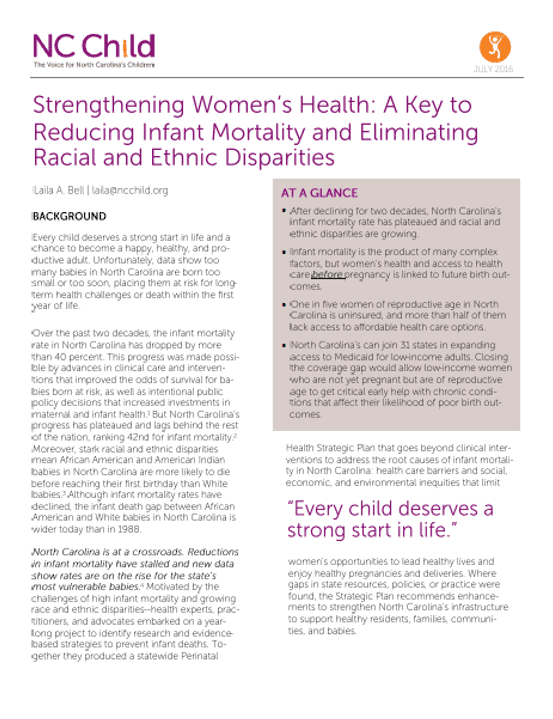Every child deserves a strong start in life and a chance to become a happy, healthy, and productive adult. Unfortunately, data show too many babies in North Carolina are born too small or too soon, placing them at risk for long-term health challenges or death within the first year of life.
Over the past two decades, the infant mortality rate in North Carolina has dropped by more than 40 percent. This progress was made possible by advances in clinical care and interventions that improved the odds of survival for babies born at risk, as well as intentional public policy decisions that increased investments in maternal and infant health.1 But North Carolina’s progress has plateaued and lags behind the rest of the nation, ranking 42nd for infant mortality.2 Moreover, stark racial and ethnic disparities mean African American and American Indian babies in North Carolina are more likely to die before reaching their first birthday than White babies.3 Although infant mortality rates have declined, the infant death gap between African American and White babies in North Carolina is wider today than in 1988.
North Carolina is at a crossroads. Reductions in infant mortality have stalled and new data show rates are on the rise for the state’s most vulnerable babies.4 Motivated by the challenges of high infant mortality and growing race and ethnic disparities–health experts, practitioners, and advocates embarked on a year-long project to identify research and evidence-based strategies to prevent infant deaths. Together they produced a statewide Perinatal Health Strategic Plan that goes beyond clinical interventions to address the root causes of infant mortality in North Carolina: health care barriers and social, economic, and environmental inequities that limit women’s opportunities to lead healthy lives and enjoy healthy pregnancies and deliveries. Where gaps in state resources, policies, or practice were found, the Strategic Plan recommends enhancements to strengthen North Carolina’s infrastructure to support healthy residents, families, communities, and babies.
North Carolina has a current opportunity to address a significant gap identified in the Perinatal Strategic Plan by implementing its recommendation to increase access to quality health care, particularly for women who are at greatest risk for poor birth outcomes. One in every five adult women in North Carolina is uninsured, the majority of whom are women of reproductive age between 19 and 44. The Affordable Care Act allows states to extend Medicaid eligibility to low-income adults who are in the coverage gap–those who earn too much to qualify for public health insurance, but too little to afford coverage in the Marketplace. Thirty-one states and the District of Columbia have already chosen to close the health insurance coverage gap for low wage adults, but North Carolina has yet to take action on this issue. The following brief explores the potential impact of increasing women’s access to health insurance on infant mortality and racial disparities in birth outcomes in North Carolina.
To see sources, download the pdf using the button below.
Download
